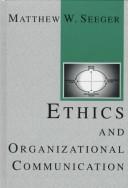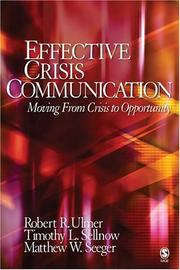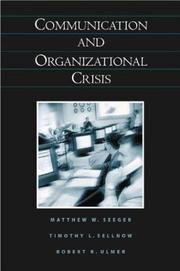| Listing 1 - 10 of 12 | << page >> |
Sort by
|

ISBN: 1572731192 9781572731196 Year: 1997 Publisher: Cresskill: Hampton press,
Abstract | Keywords | Export | Availability | Bookmark
 Loading...
Loading...Choose an application
- Reference Manager
- EndNote
- RefWorks (Direct export to RefWorks)
Social ethics --- Sociology of organization --- Mass communications --- Communication in organizations --- Moral and ethical aspects. --- #SBIB:309H250 --- #SBIB:AANKOOP --- Interne en externe communicatie: algemene werken --- Organizational communication --- Moral and ethical aspects --- Organization --- Communication in organizations - Moral and ethical aspects.
Book
ISBN: 9780470659304 9780470659298 Year: 2013 Publisher: Malden : Wiley-Blackwell,
Abstract | Keywords | Export | Availability | Bookmark
 Loading...
Loading...Choose an application
- Reference Manager
- EndNote
- RefWorks (Direct export to RefWorks)
Theorizing Crisis Communication presents a comprehensive review and critique of the broad range of theoretical frameworks designed to explain the role of communication in the development, management, and consequences of natural and man-made crises. Brings together the variety of theoretical approaches emerging in the study of crisis communication into one volume for the first time. Summarizes theories from such diverse perspectives as rhetoric, risk management, ethics, mass communication, social media, emergency response, crisis outcomes, and warning systems, while presenting clear examples of how the theory is applied in crisis communication research Presents theoretical frameworks generated by research from many disciplines including sociology, psychology, applied anthropology, public health, public relations, political science, organizational studies, and criminal justice An essential tool for a comprehensive understanding of the onset, management, response, resolution, and ultimate meaning of these devastating world events
Content analysis (Communication) --- Communication --- Crisis management. --- Emergency management. --- Analyse de contenu (Communication) --- Gestion de crise --- Gestion des situations d'urgence --- Research. --- Recherche --- Communication en gestion --- Gestion des crises
Book
ISBN: 0804799520 9780804799522 9780804788922 9780804799515 Year: 2016 Publisher: Stanford, California
Abstract | Keywords | Export | Availability | Bookmark
 Loading...
Loading...Choose an application
- Reference Manager
- EndNote
- RefWorks (Direct export to RefWorks)
This work focuses on the role of narratives during crisis, and the authors argue that ?much of the meaning, power, and ultimate impact of a crisis are functions of the ensuing network of narratives.? Crises, say Seeger and Sellnow, are by definition ?high-uncertainty events? that open up space for competing narratives to explain what happened, why, and what should happen going forward. The crises covered are broad in scope, including natural disasters, such as Superstorm Sandy; terrorism, such as 9/11; and corporate crises, such as Union Carbide?s Bhopal disaster in India, among others. A number of different types of narratives are covered, including narratives of blame and renewal, victim, hero, and memorials. Some readers might like how to identify narratives, the convergence of competing narratives, and how to measure effects of narratives on audiences. Overall, the book successfully argues for the importance of understanding how meaning is constructed around crises.
Communication in crisis management. --- Crisis management. --- Narration (Rhetoric) --- Narrative (Rhetoric) --- Narrative writing --- Rhetoric --- Discourse analysis, Narrative --- Narratees (Rhetoric) --- Crises --- Management of crises --- Management --- Problem solving --- Conflict management --- Crisis management --- Communication in crisis management --- E-books --- Communication en gestion de crise --- Gestion de crise --- Narration
Book
ISBN: 1118485939 1283960605 Year: 2013 Publisher: Chichester, West Sussex : Wiley-Blackwell,
Abstract | Keywords | Export | Availability | Bookmark
 Loading...
Loading...Choose an application
- Reference Manager
- EndNote
- RefWorks (Direct export to RefWorks)
Book
ISBN: 1787851087 1118516818 111851677X Year: 2016 Publisher: Chichester, England : Wiley-Blackwell,
Abstract | Keywords | Export | Availability | Bookmark
 Loading...
Loading...Choose an application
- Reference Manager
- EndNote
- RefWorks (Direct export to RefWorks)
Crisis management --- Risk communication --- Communication, International

ISBN: 1412914183 9781412914185 1412914191 9781412914192 Year: 2007 Publisher: Thousand Oaks (Cal.) Sage Publications
Abstract | Keywords | Export | Availability | Bookmark
 Loading...
Loading...Choose an application
- Reference Manager
- EndNote
- RefWorks (Direct export to RefWorks)
Organization theory --- Mass communications --- Public relations --- Crisis public relations --- Crisiscommunicatie --- Leidinggeven --- Casestudies --- Risicocommunicatie --- Crisismanagement --- Communication in management --- Communication in organizations --- Crisis management --- Emergency management --- #SBIB:309H250 --- Consequence management (Emergency management) --- Disaster planning --- Disaster preparedness --- Disaster prevention --- Disaster relief --- Disasters --- Emergencies --- Emergency planning --- Emergency preparedness --- Management --- Public safety --- First responders --- Crises --- Management of crises --- Problem solving --- Conflict management --- Organizational communication --- Organization --- Communication in industry --- Managerial communication --- Interne en externe communicatie: algemene werken --- Planning --- Preparedness --- Prevention --- Leiderschap --- Casestudy

ISBN: 1567205348 Year: 2003 Publisher: Westport, Conn. : Praeger,
Abstract | Keywords | Export | Availability | Bookmark
 Loading...
Loading...Choose an application
- Reference Manager
- EndNote
- RefWorks (Direct export to RefWorks)
Book
ISBN: 9781412980333 9781412980340 Year: 2011 Publisher: Thousand Oaks Sage
Abstract | Keywords | Export | Availability | Bookmark
 Loading...
Loading...Choose an application
- Reference Manager
- EndNote
- RefWorks (Direct export to RefWorks)
Communication in management --- Communication in organizations --- Crisis management --- Emergency management
Book
ISBN: 9780387797267 9780387797274 Year: 2009 Publisher: New York NY Springer New York
Abstract | Keywords | Export | Availability | Bookmark
 Loading...
Loading...Choose an application
- Reference Manager
- EndNote
- RefWorks (Direct export to RefWorks)
"As we face the threats and concerns posed by terrorism in a post 9/11 world, risk communication is becoming much more important as an intervention and mitigation strategy. Risk communication is now something that governments, the private sector and other stakeholders need to think about before, during and after a natural or intentional catastrophic event. While intentional contamination of the food supply to cause harm represents some unique challenges due to the personal nature of the threat, the concepts and examples covered in this book extend across potential events to provide a framework for how to begin thinking about the expanded importance of risk communication." Shaun Kennedy, Director, National Center for Food Protection and Defense The overlying purpose of this book is to construct a communication based approach to risk communication. In doing so, this book establishes a message-centered focus to risk communication. Section one of the book establishes definitions and parameters of risk communication, identifies the complex audience expectations for risk messages, and introduces a model of best practices for effective risk communication. In section two, the best practices are applied in four robust case studies. Section three includes chapters devoted to developing a mindful approach to risk communication, ethical considerations of risk communication, and a final chapter that discusses future developments of risk communication. This book is written for practitioners who are charged with creating and delivering risk messages to the general public; instructors who teach the following courses: Food Safety, Public Health, Health Communication, Risk Communication, Political Communication, Emergency Management; and also scholars who write in the areas of risk and crisis communication.
Digital
ISBN: 9780387797274 Year: 2009 Publisher: New York, NY Springer New York
Abstract | Keywords | Export | Availability | Bookmark
 Loading...
Loading...Choose an application
- Reference Manager
- EndNote
- RefWorks (Direct export to RefWorks)
Hygiene. Public health. Protection --- Food science and technology --- voedingschemie --- gezondheidszorg --- voedingsleer
| Listing 1 - 10 of 12 | << page >> |
Sort by
|

 Search
Search Feedback
Feedback About UniCat
About UniCat  Help
Help News
News